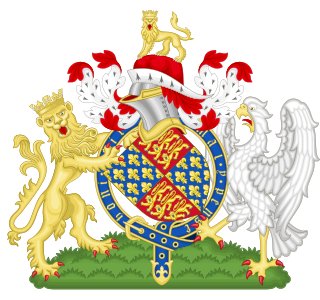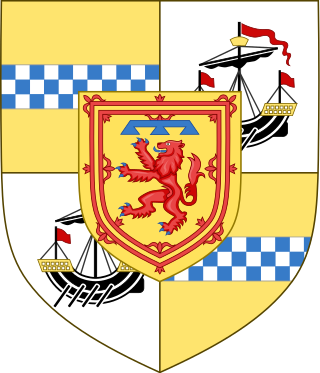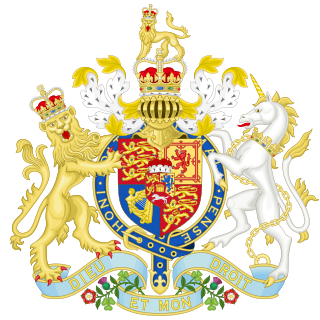In English common law, fee tail or entail, or tailzie in Scots law, is a form of trust, established by deed or settlement, that restricts the sale or inheritance of an estate in real property and prevents that property from being sold, devised by will, or otherwise alienated by the tenant-in-possession, and instead causes it to pass automatically, by operation of law, to an heir determined by the settlement deed. The terms fee tail and tailzie are from Medieval Latin feodum talliatum, which means "cut(-short) fee". Fee tail deeds are in contrast to "fee simple" deeds, possessors of which have an unrestricted title to the property, and are empowered to bequeath or dispose of it as they wish. Equivalent legal concepts exist or formerly existed in many other European countries and elsewhere; in Scots law tailzie was codified in an Act of 1685 which in 1896 was given a short title as an Entail Act.

The Wales and Berwick Act 1746 was an Act of the Parliament of Great Britain that created a statutory definition of England as including England, Wales and Berwick-upon-Tweed.

In Scotland, a baron or baroness is the head of a feudal barony, also known as a prescriptive barony. This used to be attached to a particular piece of land on which was situated the caput or essence of the barony, normally a building, such as a castle or manor house. Accordingly, the owner of the piece of land containing the caput was called a baron or baroness. According to Grant, there were around 350 identifiable local baronies in Scotland by the early fifteenth century and these could mostly be mapped against local parish boundaries. The term baron was in general use from the thirteenth century to describe what would have been known in England as a knight of the shire.

The Treason Act 1351 is an Act of the Parliament of England which codified and curtailed the common law offence of treason. No new offences were created by the statute. It is one of the earliest English statutes still in force, although it has been very significantly amended. It was extended to Ireland in 1495 and to Scotland in 1708. The Act was passed at Westminster in the Hilary term of 1351, in the 25th year of the reign of Edward III and was entitled "A Declaration which Offences shall be adjudged Treason". It was passed to clarify precisely what was treason, as the definition under common law had been expanded rapidly by the courts until its scope was controversially wide. The Act was last used to prosecute William Joyce in 1945 for collaborating with Germany in World War II.

Prince and Great Steward of Scotland are two of the titles of the heir apparent to the throne of the United Kingdom. The current holder of these titles is Prince William, who bears the other Scottish titles of Duke of Rothesay, Earl of Carrick, Lord of the Isles and Baron of Renfrew.

Registers of Scotland (RoS) is the non-ministerial department of the Scottish Government responsible for compiling and maintaining records relating to property and other legal documents. They currently maintain 20 public registers. The official responsible with maintaining the Registers of Scotland is the Keeper of the Registers of Scotland. By ex officio, the Keeper of the Registers of Scotland is also the Deputy Keeper of the Great Seal of Scotland. The Keeper of the Registers of Scotland should not be confused with the Keeper of the Records of Scotland.

The Tenures Abolition Act 1660, sometimes known as the Statute of Tenures, was an Act of the Parliament of England which changed the nature of several types of feudal land tenure in England. The long title of the Act was An act for taking away the Court of Wards and liveries, and tenures in capite, and by knights-service, and purveyance, and for settling a revenue upon his Majesty in lieu thereof.
Feu was long the most common form of land tenure in Scotland, as conveyancing in Scots law was dominated by feudalism until the Scottish Parliament passed the Abolition of Feudal Tenure etc. (Scotland) Act 2000. The word is the Scots variant of fee. The English had in 1660 abolished these tenures, with An Act taking away the Court of Wards..., since 1948 known as the Tenures Abolition Act 1660.

The Foreign Protestants Naturalization Act 1708, sometimes referred to as the Foreign and Protestants Naturalization Act 1708, was an Act of the Parliament of Great Britain. The act was passed on 23 March 1709, which was still considered part of the year 1708 in the British calendar of the time. It was passed to allow the naturalisation of French Protestants (Huguenots) who had fled to Britain since the revocation of the Edict of Nantes in 1685. It was one of the British Subjects Acts 1708 to 1772.
Thirlage was a feudal servitude under Scots law restricting manorial tenants in the milling of their grain for personal or other uses. Vassals in a feudal barony were thirled to their local mill owned by the feudal superior. People so thirled were called suckeners and were obliged to pay customary dues for use of the mill and help maintain it.

The Isle of Man Purchase Act 1765, also known as the Act of Revestment, purchased the feudal rights of the Dukes of Atholl as Lords of Man over the Isle of Man, and revested them into the British Crown.

The Abolition of Feudal Tenure etc. (Scotland) Act 2000 was a land reform enforced by an Act of the Scottish Parliament that was passed by the Scottish Parliament on 3 May 2000, and received Royal Assent on 9 June 2000.
In Scots law, tailzie is a feudal concept of the inheritance of immovable property according to an arbitrary course that has been laid out, such as in a document known as a "deed of tailzie". It was codified by the Entail Act 1685.

The Short Titles Act 1896 is an Act of the Parliament of the United Kingdom. It replaces the Short Titles Act 1892.

The Heritable Jurisdictions (Scotland) Act 1746 was an Act of Parliament passed in the aftermath of the Jacobite rising of 1745 abolishing judicial rights held by Scots heritors. These were a significant source of power, especially for clan chiefs since it gave them a large measure of control over their tenants.

The Durham Act 1836 was an Act of the Parliament of the United Kingdom. It abolished the temporal authority of the Bishop of Durham within the County Palatine of Durham, placing the county under lay administration. Previously, since 1075, the so-called prince-bishops had substantial powers as earls "with the right to raise an army, mint his own coins, and levy taxes".

The Statute of Distribution was an Act of the Parliament of England in 1670. It deals with the administration of intestate estates. It was made perpetual by the Administration of Intestates' Estate Act 1685.

The Mortuaries Abolition Act 1713 was an Act of the Parliament of Great Britain.
Entail Act is a stock short title used in the United Kingdom for legislation relating to entails.











